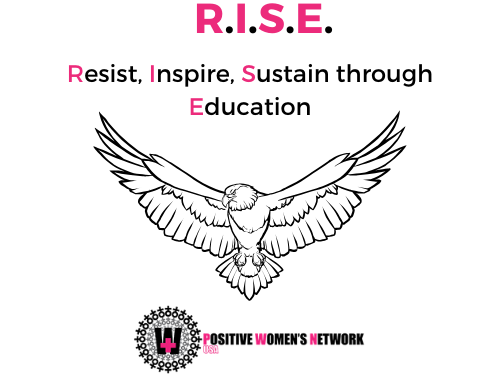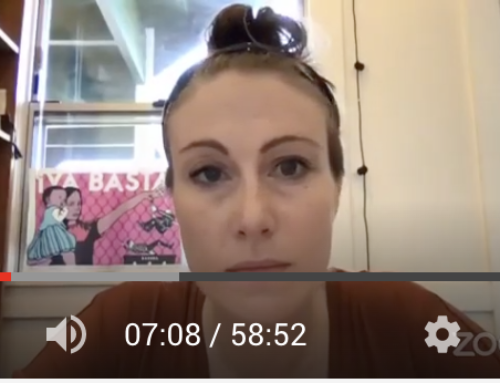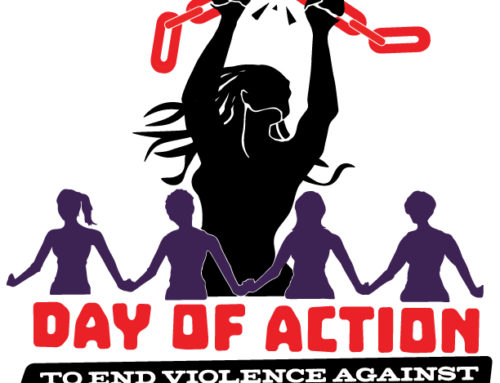HIV Volunteerism: In Our House
by Barb Cardell

“What do you do?”
It is a common question that I dread.
“I am a PROFESSIONAL volunteer,” I usually respond with a cheery smile
plastered on my face.
What am I supposed to say?
“I CAN’T work because 20 years ago I tested HIV+ and just surviving was my full time job?”
“I DON’T work because fear and ignorance of HIV make people afraid to eat food I prepare?”
“I am unable to work because the dominant paradigm traps me with a traditional definition of a job, the hours, the attendance, even the “professional” outfits that I am often unable to provide?” (Those are the bad days when I am pissed at how inflexible employers are).
I am fortunate in many ways. I am married and my husband long ago offered to be the financial support in our family. He provides the health insurance, the roof over our heads, the food on the table. Does he hold it over me? Nope, for some reason that still mystifies me, he is just glad to have me alive and in his life. Does it make it any easier to be the stay at home partner? Nope, all our values and worth as adults are tied to our jobs, our paid jobs.
So what do I do? I volunteer, a lot. I squeeze 28 hours out of every 24, over scheduling myself so that I can be at every meeting, helping every person that needs me or taking every shift.

Here is the puzzling part, what kind of job would I like or be good at? I don’t even know. 20 years of advocating and educating has made me pretty good at bunch of different things, I was blessed with a pretty agile mind and an innate curiosity. What does that sound like to you? Like so many other under-employed HIV+ women, I don’t even know what a job that uses my unique skills looks like. What does it look like to you?
So here is a challenge to our allies, coalitions, boards, and organizations that love and rely on their “HIV+ super-volunteers”: if you love our work ethic, if you don’t know how you would survive without our HIV+ knowledge and experience, invest in skills-building and economic opportunities that support us. Invest in our development as professionals including options to take a leadership role. Forward us job opportunities, always demand speaker honorariums when others ask if you have HIV+ people who can speak, send us information on skills-building trainings, and put extra effort into ensuring that when we are given the chance to present or participate in a meeting or conference that there are resources to fund us to get there. If you think we are perfect for a job, ASK us if we are interested. We might not even believe we are qualified. If you want our expertise, OFFER US A JOB, OFFER TO PAY US. Trust me, it won’t offend us, we will feel honored.
Women living with HIV are often pushed into poverty or economically unstable situations. To uphold the HIV community’s call for economic justice, we must practice what we preach in our own house. We must take to heart and walk the talk in our own house. Otherwise, we are not advocating for people living with HIV, we are fostering its devastating impact.
 “What do you do?”
It is a common question that I dread.
“I am a PROFESSIONAL volunteer,” I usually respond with a cheery smile
plastered on my face.
What am I supposed to say?
“I CAN’T work because 20 years ago I tested HIV+ and just surviving was my full time job?”
“I DON’T work because fear and ignorance of HIV make people afraid to eat food I prepare?”
“I am unable to work because the dominant paradigm traps me with a traditional definition of a job, the hours, the attendance, even the “professional” outfits that I am often unable to provide?” (Those are the bad days when I am pissed at how inflexible employers are).
I am fortunate in many ways. I am married and my husband long ago offered to be the financial support in our family. He provides the health insurance, the roof over our heads, the food on the table. Does he hold it over me? Nope, for some reason that still mystifies me, he is just glad to have me alive and in his life. Does it make it any easier to be the stay at home partner? Nope, all our values and worth as adults are tied to our jobs, our paid jobs.
So what do I do? I volunteer, a lot. I squeeze 28 hours out of every 24, over scheduling myself so that I can be at every meeting, helping every person that needs me or taking every shift.
“What do you do?”
It is a common question that I dread.
“I am a PROFESSIONAL volunteer,” I usually respond with a cheery smile
plastered on my face.
What am I supposed to say?
“I CAN’T work because 20 years ago I tested HIV+ and just surviving was my full time job?”
“I DON’T work because fear and ignorance of HIV make people afraid to eat food I prepare?”
“I am unable to work because the dominant paradigm traps me with a traditional definition of a job, the hours, the attendance, even the “professional” outfits that I am often unable to provide?” (Those are the bad days when I am pissed at how inflexible employers are).
I am fortunate in many ways. I am married and my husband long ago offered to be the financial support in our family. He provides the health insurance, the roof over our heads, the food on the table. Does he hold it over me? Nope, for some reason that still mystifies me, he is just glad to have me alive and in his life. Does it make it any easier to be the stay at home partner? Nope, all our values and worth as adults are tied to our jobs, our paid jobs.
So what do I do? I volunteer, a lot. I squeeze 28 hours out of every 24, over scheduling myself so that I can be at every meeting, helping every person that needs me or taking every shift.
 Here is the puzzling part, what kind of job would I like or be good at? I don’t even know. 20 years of advocating and educating has made me pretty good at bunch of different things, I was blessed with a pretty agile mind and an innate curiosity. What does that sound like to you? Like so many other under-employed HIV+ women, I don’t even know what a job that uses my unique skills looks like. What does it look like to you?
So here is a challenge to our allies, coalitions, boards, and organizations that love and rely on their “HIV+ super-volunteers”: if you love our work ethic, if you don’t know how you would survive without our HIV+ knowledge and experience, invest in skills-building and economic opportunities that support us. Invest in our development as professionals including options to take a leadership role. Forward us job opportunities, always demand speaker honorariums when others ask if you have HIV+ people who can speak, send us information on skills-building trainings, and put extra effort into ensuring that when we are given the chance to present or participate in a meeting or conference that there are resources to fund us to get there. If you think we are perfect for a job, ASK us if we are interested. We might not even believe we are qualified. If you want our expertise, OFFER US A JOB, OFFER TO PAY US. Trust me, it won’t offend us, we will feel honored.
Women living with HIV are often pushed into poverty or economically unstable situations. To uphold the HIV community’s call for economic justice, we must practice what we preach in our own house. We must take to heart and walk the talk in our own house. Otherwise, we are not advocating for people living with HIV, we are fostering its devastating impact.
Here is the puzzling part, what kind of job would I like or be good at? I don’t even know. 20 years of advocating and educating has made me pretty good at bunch of different things, I was blessed with a pretty agile mind and an innate curiosity. What does that sound like to you? Like so many other under-employed HIV+ women, I don’t even know what a job that uses my unique skills looks like. What does it look like to you?
So here is a challenge to our allies, coalitions, boards, and organizations that love and rely on their “HIV+ super-volunteers”: if you love our work ethic, if you don’t know how you would survive without our HIV+ knowledge and experience, invest in skills-building and economic opportunities that support us. Invest in our development as professionals including options to take a leadership role. Forward us job opportunities, always demand speaker honorariums when others ask if you have HIV+ people who can speak, send us information on skills-building trainings, and put extra effort into ensuring that when we are given the chance to present or participate in a meeting or conference that there are resources to fund us to get there. If you think we are perfect for a job, ASK us if we are interested. We might not even believe we are qualified. If you want our expertise, OFFER US A JOB, OFFER TO PAY US. Trust me, it won’t offend us, we will feel honored.
Women living with HIV are often pushed into poverty or economically unstable situations. To uphold the HIV community’s call for economic justice, we must practice what we preach in our own house. We must take to heart and walk the talk in our own house. Otherwise, we are not advocating for people living with HIV, we are fostering its devastating impact. 




